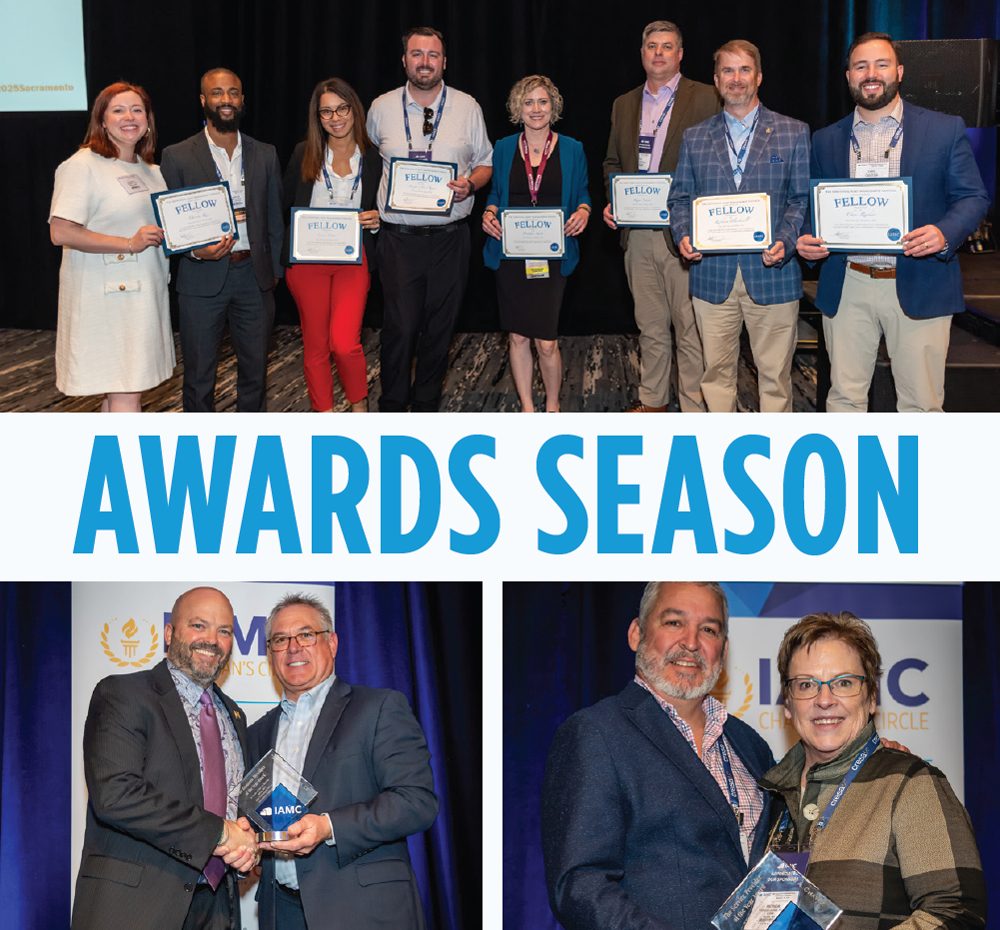Content Matters at IAMC
In today’s rapidly changing marketplace, we must all stay ahead of trends and anticipate future needs to remain competitive. IAMC provides our members with valuable content in a variety of formats, all while fostering an inclusive atmosphere for Corporates, Service Providers and Economic Developers. This approach not only equips our companies and communities with the tools they need to succeed but also creates a support system to leverage each other’s strengths.

This high-quality, relevant content addresses both current challenges and opportunities in industrial real estate. This was never timelier than coming off the recent Spring Forum in Sacramento. We had Keynote speakers Mark Devine, Zack Kass and Cally Beaton plus workshops, breakouts and facilitator-led discussions on our core content topics such as C-Suite; Construction Management; Facilities Management; Lease Administration; Outsourcing Models and Strategies; Site Selection; Surplus Property Disposition; Technology Applications; and Transactions Management.
I love our immediate past Chair Karen Shchuka’s analogy comparing IAMC to Disney World. Our Forums are Magic Kingdom, but our locals, international programs and webinars are Epcot, Animal Kingdom and Hollywood Studios. In between each Forum, we have these smaller, more intimate and content-heavy programs to provide year-round development opportunities to our broader membership. All these offerings include networking opportunities to facilitate connections among members to share experiences and collaborate on solutions.
IAMC is committed to empowering our members through our content, helping anticipate their needs, to stay ahead in a competitive landscape and be a vital resource for professionals in industrial real estate. We want you to join us at our Forums, but to enjoy the full experience of IAMC, be sure to participate in all our offerings. I’ll see you soon at a local meeting, an international event, on the web or in the fall in Indy. And be sure to say hello!
— Cary Hutchings
AI Could Redefine the Future of Industrial Asset Management

Among the highlights of the recently held IAMC Forum in Sacramento, California, was a keynote address by Zack Kass, a futurist and AI expert who formerly headed go-to-market strategy for OpenAI. I followed up with him by email after the event so some of the insights he shared on stage could be shared on the page.
— Adam Bruns
Describe the top three opportunities and top three concerns among corporate leaders when it comes to AI.
Zack Kass: Opportunities: 1) Productivity Improvements at Scale: AI is transforming knowledge work by automating the mundane so people can focus on higher-value tasks. We’re already seeing 30–70% time savings across functions and industries, and this trend will only accelerate in the coming months.
2) New Business Models: These technological breakthroughs are yielding more than efficiency, but also invention. AI is enabling dynamic pricing, personalized interfaces and entirely new digital products. It’s not just streamlining how we work; it’s changing the dynamic of what’s possible for operations and offerings.
3) Talent Leverage: AI enhances top performers, giving every employee a digital co-pilot, extending their reach, speed and insight. That’s a huge opportunity for companies that are able to act fast and incorporate the technology into their best practices, particularly for smaller, leaner teams.
Concerns: 1) Talent Adaptation: Leaders are realizing that integrating AI isn’t just a tech challenge, rather a human one. Retraining teams, evolving job roles and building digital fluency is hard, especially at scale.
2) Organizational Agility: Large enterprises often struggle to adapt quickly. AI rewards speed and experimentation, but legacy structures and rigid processes can slow down adoption.
3) Workforce Readiness: Many employees feel unprepared. Not because they’re incapable, but because they haven’t been given the context, tools or permission to work differently. That creates friction and slows momentum.
In which industries have you seen the most dramatic results of applied AI practices to everyday business?
Zack Kass: We’ve seen some of the most profound gains in:
- Biotech & Life Sciences: AI is accelerating drug discovery, protein folding and clinical trial analysis consequently compressing timelines that used to take years into months or weeks.
- Education: Personalized learning platforms are becoming truly adaptive, offering students real-time feedback, tutoring and support — especially in underserved communities. Imagine the power of providing every single child access to a private tutor, on demand.
- Financial Services: From fraud detection to portfolio optimization, AI is enhancing precision and efficiency. Firms are also using large language models for compliance, reporting and customer service.
- Professional Services: Law, accounting and consulting firms are using AI to generate first drafts, analyze documents and prep client materials, dramatically reducing time-to-delivery.
When it comes to the profession and practice of corporate real estate/facilities — i.e., managing and making location decisions for a global company’s range of operations across many countries and jurisdictions — where do you see the most immediate opportunities for AI deployment?
Zack Kass: AI has real momentum here. A few high-impact areas:
- Site Selection Optimization: AI can now analyze vast data sets — labor availability, infrastructure, tax policy, logistics, geopolitical risk — and synthesize optimal location strategies in hours instead of months.
- Energy & Facilities Management: AI systems are reducing energy costs and emissions by dynamically adjusting HVAC, lighting and space utilization based on real-time data.
- Portfolio Risk Modeling: For global companies with complex footprints, AI can help evaluate exposure to climate change, regulatory shifts or lease volatility by driving smarter decisions about asset allocation and long-term planning.
What particularly compelling questions or issues came up at the IAMC Forum session in Sacramento?
Zack Kass: I saw how corporate real estate leaders are embracing AI not just to cut costs, but to make smarter, faster and more strategic decisions across their portfolios. It’s clear this community sees AI as a catalyst for redefining the future of industrial asset management. It’s also clear they’re all teeming with excitement about the massive demand spike we’re going to see across energy production sites and data centers.
I am a journalist and editor in chief of a 71-year-old business publication who aims differentiate our material based on enterprise journalism and original interviewing of humans. As AI becomes more prevalent, do you see our approach increasing our value for those wanting their fellow humans’ unmediated, true-to-life perspectives?
Zack Kass: In a world where AI can generate infinite content, human-sourced reporting becomes a differentiator. What you choose to do intentionally — including original interviews, contextual storytelling and informed skepticism — will be the antidote to synthetic noise. Readers will increasingly seek out perspectives grounded in real conversations, especially as AI reshapes every industry. Moreover, in a world where anyone can be an expert in anything, brand becomes a critical currency.
Did you employ AI in responding to any of these questions?
Zack Kass: Yes, and intentionally so. We use AI as a brainstorming partner and first-draft generator. It helps surface angles, frame ideas, and create a starting point. But the thoughts, stories and edits come from me and my team. AI speeds up the how so we can focus more deeply on the what and why.

The IAMC Spring Forum saw a number of awards conferred..
James Chavez (lower right, above), president and CEO of South Carolina Power Team, received IAMC’s 2025 Michael P. Hickey Service Provider of the Year Award. Dave Quinn (lower left), CEcD, Fairview Texas Economic Development director and leader of TexasEDConnection, was the recipient of IAMC’s 2025 Mary Jo Hanover Economic Developer of the Year Award. Award winners:
- are stalwart ambassadors for IAMC
- uphold the highest standards of ethics and integrity in their profession
- strongly believe in giving back to their industry
- work to make this world a better place
- are mentors within the profession.
The Forum also featured the graduation of IAMC’s newest cohort of IAMC Fellows after completion of five leadership development seminars and taking on leadership roles in IAMC activities. The 2025 graduates are (l. to r. in the top photo):
- Elizabeth Loving, Mohr Capital
- Marcus Rose, NFI Industries
- Casey Evans, Orlando Economic Partnership
- Joseph Sayre, Avangrid – RG&E/NYSEG
- Heather Smith, Wisconsin Economic Development Corporation
- Ryan Niesen, San Bernardino County
- Richard Blackwell, Agracel
- Chris Rankin, Lubbock Economic Development Alliance
- Michael Piscoran, United States Department of State (not pictured)
- Ann Marie Collins, Savills (not pictured).
